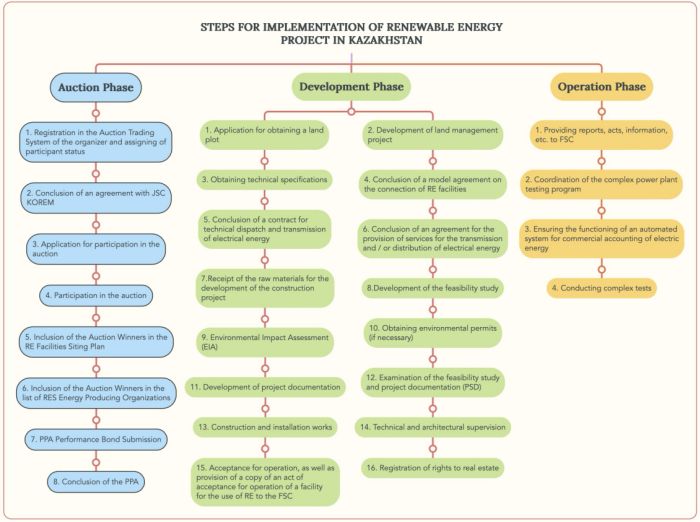In order to select the lowest-cost RE projects and to establish
competitive market prices for renewable energy, a mechanism for RE
auctions was introduced in 2017, replacing feed-in tariffs.
Auctions are organised by the Kazakhstan Electricity and Power
Market Operator (KOREM) and a Single Purchaser conducts purchase
and energy sale of electric energy.
Kazakhstani laws require a power-generating company to obtain a
number of regulatory approvals and permits for the construction and
operation of a power plant.
The primary permit to launch a project is to obtain land use rights. Site selection is one of the most critical decisions and determines the success of the project's implementation, because the site determines how optimally a RES will be used and, consequently, the economic feasibility of the project. This is particularly true for wind, hydro and solar energy.
The construction and operation of renewable energy facilities require several stages of project procedures and design. After receiving approval from local executive authorities, the RE producer connects to the network. Transmission companies must provide grid connection points with an appropriate voltage class and ensure that RE facilities are connected to the grid. Agreement on the connection of the RE facility stipulates that the transmission company shall provide the RE facility with access to the network by providing the connection point specified in the Technical Specifications (TS).
Before construction and installation work begins, the project owner must notify the local executive authorities of the State Architectural and Construction Supervision Authority (GASK) about the commencement of the activity.
The Environmental Code provides for a number of environmental requirements for businesses and other activities. Environmental requirements must be taken into account at the time of the designing, commissioning and operation of economic (industrial) objects. The commissioning of enterprises, construction works and other objects without the installation of equipment for the clearing, neutralization and recycling of dangerous wastes, emissions, and subsequent clean-ups, the provision for and the observance of standards of environmental quality, and rational use of the natural resources provided by the project is forbidden.
[1] Article 68.12 of the Law of the Republic of Kazakhstan dated July 16, 2001, No. 242-II, On Architectural, Urban Planning and Construction Activities in the Republic of Kazakhstan (the Urban Construction Law).
The Environmental Impact Assessment (EIA) - process, which includes the assessment of any likely impacts on the environment and on human health by businesses and other activities, the development of measures with a view to the prevention of adverse effects (destruction, degradation, damage and depletion of natural ecological systems and natural resources) and improvement to the environment, subject to the requirements of the environmental laws. EIA is obligatory for all types of businesses and other activities likely to directly or indirectly impact the environment and human health. No elaboration and/ or implementation of business and other activity projects capable of affecting the environment are permitted unless an environmental impact assessment is performed.
Environmental permit certifies the right of individual entrepreneurs and legal entities to carry out a negative impact on the environment and determine the environmental conditions for implementing activities. Depending on the categories of hazardous facilities (I-IV categories), environmental permits are divided into integrated and environmental permits for impact. Environmental permit for impact is issued for I and II categories of objects, whereas III and IV categories of objects do not require such permit.
For the implementation of construction and installation works, a RE producer must conclude an agreement with a specialised organisation that has a state licence on construction and installation works, as stipulated in the Law on Permissions and Notifications, for implementing these works.
Finally, a RE producer should obtain an entitlement document with a note on the introduction to the information system of the legal cadastre of a newly created immovable property, a renewable energy facility.
According to Chapter 11 of the Urban Construction Law, a completed construction facility is subject to commissioning. The project owner carries out acceptance and commissioning of the constructed facility after it is ready by the approved project and availability of the declaration of conformity, conclusions on the quality of construction and installation works, and compliance of executed works with the approved project.

Download the Steps for Implementation of Renewable Energy Projects in Kazakhstan
The content of this article is intended to provide a general guide to the subject matter. Specialist advice should be sought about your specific circumstances.


